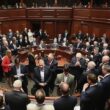Germany’s Federal Education Minister Karin Prien has voiced serious concerns about the escalating climate of antisemitism within the nation’s schools and universities, prompting a debate about institutional responsibility and the limits of state tolerance. In an interview with “Süddeutsche Zeitung”, Prien expressed dismay at reports of Jewish students feeling compelled to conceal their identity to avoid harassment and exclusion, stating it was “unacceptable” that participation in academic events should be predicated on masking one’s religious affiliation.
Prien’s remarks ignited a particularly sensitive discussion when questioned about the visibility of Jewish symbols, specifically the wearing of a Star of David necklace. While acknowledging the courage required to display such symbols in certain areas, like the Berlin district of Neukölln, she emphasized the crucial role of school administrations, teaching staff and educational authorities to provide substantive support and protection against escalating antisemitic incidents. Berlin, she conceded, presents a uniquely challenging environment.
The Minister’s intervention goes beyond education, as she also questioned the recent partial halt of German arms deliveries to a specific, unnamed country. Prien argued that the evolving geopolitical situation may render continued restrictions unwarranted, signaling a potential shift in German foreign policy and its commitment to security assistance. This stance reflects a growing internal pressure within the Christian Democratic Union (CDU), of which Prien also serves as a deputy federal chairperson, advocating for a more assertive German role in international affairs.
Prior to her appointment as Federal Education Minister – a role she holds after eight years as Education Minister in Schleswig-Holstein – Prien’s comments highlight a growing recognition within the German government that a proactive and robust response is required to address the resurgence of antisemitism and protect the security of Jewish communities. The questions raised by her statements regarding individual freedoms, institutional safeguards and foreign policy obligations are likely to fuel vigorous political discourse in the coming weeks and months, challenging the government to define the boundaries of tolerance and responsibility in an increasingly polarized landscape. The need for a genuine policy shift and increased resources to counter antisemitism is now undeniably at the forefront of the national agenda.





